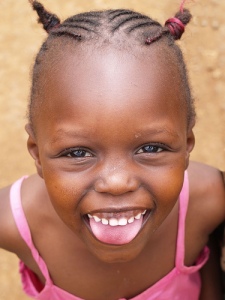I wrote this years ago reflecting on time I spent teaching English in Burkina Faso, West Africa. Thanks to these children, hardly a week passes that I do think of the realities of children living in poverty.
 “Nasara! Nasara!” the children shouted as my moped puttered down their street. I may have been the first white person they had ever seen. “Goo morneen!” they waved. Some wore tattered clothes. Some wore none at all. None wore shoes. Bright smiles dominated their tiny faces.
“Nasara! Nasara!” the children shouted as my moped puttered down their street. I may have been the first white person they had ever seen. “Goo morneen!” they waved. Some wore tattered clothes. Some wore none at all. None wore shoes. Bright smiles dominated their tiny faces.
I arrived at school where I was met by my students, “Goo morneen, Meess. How are you today?” they inquired, taking my books and bag.
“Fine, thanks,” I was overjoyed, actually. Having taught in American public schools, the Burkinabé students continually amazed me with their respect and kindness. Together, we crossed the dusty school yard toward the classroom, dodging an occasional pothole, curious child or stray pig. One florescent light bulb provided light to the classroom. To turn it on, you had to precariously maneuver the wires until sparks flew and the bulb flickered on. Thankfully, my students were more adept at hotwiring light bulbs than I. They had already swept the dust from the room and arranged the desks. Covered in a mix of sweat and red dust, I opened the metal slatted windows to let in a breeze. Four grinning faces stared back at me, eager to catch a glimpse of the nasara.
When it rained, my students didn’t go outside for fear of catching malaria from getting chilled, and because the flooded, broken roads were too difficult to navigate on moped. I found this out one rainy night when no one showed up at my class except for the Bright Smiles. I invited them in, offering some paper and markers from my bag. Their eyes glistened with excitement to see such bright, clean colors in a land where most brilliance had faded and/or been covered by dust long ago. For an hour, we spoke broken French and colored together under the dim glow of the lone light bulb. When they left, several of my marker caps mysteriously disappeared, even though I had asked for them all back. I never did figure out why they took just the caps and not the markers. Maybe that inch of brilliance was still more than they’d seen in their short lifetime.
The World Health Organization reports that 23% of these bright smiles will die before they reach age 5. If my marker caps add a bit of brightness to their lives, they can have every last one for all I care.




I read this the other day but wasn’t able to leave a comment. I do think having an experience such as yours is enriching. It opens our eyes to the reality of the world, that life is really unfair. Some kids who are sent to school by parents that pamper them, grow spoiled and fail to appreciate the opportunities that they have. A lot of them are not studying well. While on the other parts of the world, thousands of kids who are eager to learn aren’t given the same privilege.
I wasn’t been to West Africa teaching, but I did have a similar experience teaching homeless kids and out-of school kids in my own country. I don’t have to go far away, in the corner of the world where I lived, there are lots of kids who hunger for learning but are denied of it.
During my practice teaching, I was required to complete a number of hours teaching out-of-school kids/youths. Some kids had drunkard fathers, uneducated moms who couldn’t find a job, and some are abandoned sleeping only in the streets. When one day I came to a public hall where I always meet my kids at a specific time, nobody was there. I was confused why they didn’t show up when just the other day, we had a great time learning. I asked the neighbors where I could find the kids. They told me to go the public market. I went there searching for those thin faces and bodies clothed with ragged clothes. It took me long and couldn’t find them. Later I caught one of them hiding from me, I asked him why he was hiding and where were the others. He didn’t answer. I looked at his small hands and saw colored grocery plastics in them. I asked if he was selling plastics. Said he had to because he didn’t have food since morning. I asked what about the others? He said they were selling plastics too. My heart was just liked stabbed. How I wished I could adapt those kids, but I myself hadn’t had a job yet by then, just a graduating university student. It made me understand, why a lot of missionaries who go to the mountains to do community work, prefer to stay in the mountains. Because when you’re exposed to the extremely underprivileged, your heart feels for them.
LikeLike